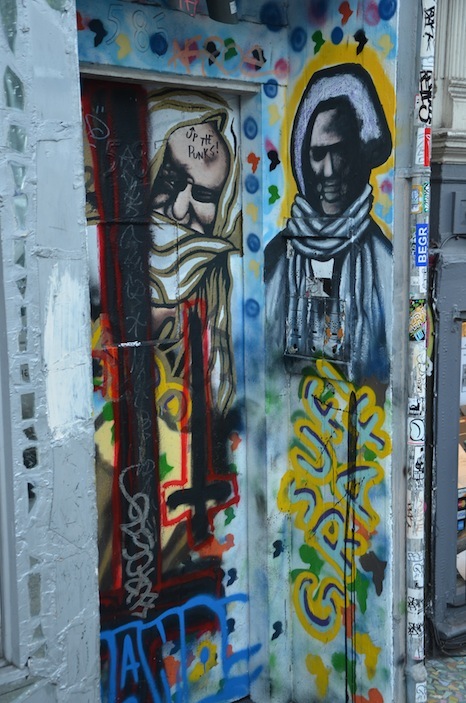Author Archive
Germans Are On Time…Except When They’re Not
Germans are sticklers for time. This, you can tell, by the prevalence of clocks everywhere. No matter where you walk, it’s likely you’ll see a clock proudly displaying its hands as if to say: “Be on time!” This is a mantra Germans live by, except, of course, when they don’t.
See, the whole idea you may have about Germans and timeliness is likely to be shattered within a few days of being here. Culturally, it’s safe to say that people still generally keep appointments punctual; if it’s a business meeting, this is especially important. But unlike Japan, where people are on time but so are trains and other services, Germany hasn’t quite followed suit.
I’ve taken Deutsche Bahn trains several times to connect between cities here, and I don’t think I’ve arrived at my scheduled time yet. Granted, it’s not likely you’ll get to your destination too late—delays of 20 or 30 minutes are the norm—but it was certainly counter to what I expected upon arriving here. In the case of the trains, a comedy of errors have been the culprit for DB in recent years, ranging from axel problems to lax track maintenance to disgruntled employees.
Don’t get me wrong—I’m not advising you to come here and ignore any concept of punctuality. I just think that it’s about time Germans reconsider the seemingly national sense of pride they display in regards to timeliness, as these days it is more myth than reality.
IDmanila: Use Your Natural Beauty for Inspiration, Not Someone Else’s Artificial Reality!
If you’ve ever been to the newly sprung up, modern cities of the Middle East, it is no secret that Filipinos make up a huge part of today’s culture there. It seems that every hotel in Abu Dhabi, Doha or Dubai are staffed with Filipinos, working diligently and bringing their natural hospitality abroad. It is a win-win for everyone—the hotels get naturally hard-working, hospitable workers who speak English at a native level, while the staff have opportunities to earn salaries that they wouldn’t back home. Filipinos working in other industries flock to the Middle East as well—oil and gas being a major one.
Given the influx of Filipinos in that part of the world, it is not surprising that some aspects of the modern-day Middle Eastern culture would make their way to the Philippines as well—airplanes fly in both directions, after all. But on a recent visit to Manila, I was saddened by one particular element that seemed to be springing up—the idea of smoke-and-mirrors culture.
While the Middle East has a long and storied history as a trading post, today much of it has been reinvented into a playground for the rich. Oil money flows freely, and developers race to build the tallest, shiniest, sleekest, fanciest office and residential spaces they can dream up. In trying to attract buyers and wow the rich, there is little consideration given to historical context or the surrounding environment. And while there is some history there—there is not much else. Dubai was built on a sand dune, just the way Las Vegas was 60 years earlier in the Western United States.
The Philippines, however, is not the Middle East. It is full of a rich cultural heritage that is preserved today, a spiritual and energetic people who carry their flag proudly. Physically, it is a lush, green, fertile land that some of the world’s most exotic and unique species call home. There is no need to create something artifical, tall, shiny, sleep and fancy here—because the natural beauty is strong to begin with.
And yet, one of the developments I saw being sold was called “The Venice Residences”—something seemingly straight out of Dubai. Little homes built on the banks of a fake waterway, complete with verandas and gondoliers. And in my estimation, something so tackily forced in hopes of raising the real estate price tag.
I sincerely hope the Philippines—with all of its spirit and pride and natural beauty—will not fall into the trap of trying to copy the artificial culture of Dubai or Las Vegas, which don’t have the natural gifts to work with that should be appreciated here.
America’s Fascination with British Accents…and Vice Versa
In the U.S., it seems like a must for any reality television show to have someone on the panel that boasts a heavy British accent. Whatever the reason, it catches our ear, women find it charming, and it creates memorability. Not to mention that just about everyone can reel off their rendition of a British accent on demand.
But while it makes enough sense intuitively that it would, I am still surprised every time the same effect occurs on the other side of the Atlantic. Despite that, it appears that British people have the same reaction to American accents as Americans do to theirs. Catchy, charming and memorable. And yes, the English do love to offer their renditions of American accents as much as we do theirs!
So if you’re in America and you want to be considered exotic, fear not…there still is a stage for you—in England.
IDmálaga: Pull Up!
Forget the Elements: These People Love the Outdoors
For a country that sits so far north it’s often frozen, with parts that see so much rain you could float away, Canadians don’t use anything as an excuse to prevent them from enjoying the great outdoors. Taking great pride in their country’s abundant natural beauty, enjoying this beauty is ingrained into the Canadian psyche, no matter what the weather may be on any given day.
Business happens here just as it does anywhere else in the world, and yet somehow, people don’t seem to lose sight of what surrounds them and live with blinders, as too many of us are guilty of. When the weather’s nice, everyone is out jogging, enjoying the waterfront in Toronto or the Seawall in Vancouver. When it’s not, they just layer up and go for a hike, perhaps with cameras in tow to capture the beauty they are bound to stumble upon.
If there is one thing all of us can learn from Canada (and actually, there are many), it would be to disconnect from the concrete-and-cellular world we live in today, and reconnect with nature from time to time. It truly refreshes your soul.
IDistanbul: Five Times a Day? Please, No!!
As any of you who have been to the Middle East know, it’s not unlikely that you may be wrestled from your first-morning jet lag by the croons of an imam with the first of his five daily azan, or calls to prayer–at least if you’re anywhere within earshot of a mosque (which you probably are). That served as my alarm clock on my first visit, and though it’s not exactly hummingbirds singing to the daisies, there’s a certain romantic, haunting quality about it–certainly a great way to remind you where you’ve awoken. Given that the call of the imam, or muezzin, is considered an art form, it’s usually somewhat melodic, albeit a bit tinny depending on the quality of the speakers…
Apparently, not everyone’s experience is so pleasant. Istanbul’s head of religions affairs has responded to complaints by setting up singing lessons to make sure that all 3,000 of the city’s mosques have a pleasant tune for the
neighbors. And for those voices that are just beyond repair?
The loudspeaker in the mosque will be linked to a central recording system that will broadcast a professional voice! Which begs the questions–why not just do this to begin with, and who exactly determines what the threshold of being able to sing vs. not sing is?
IDsanfrancisco: Haight Art
Cafe Culture: How to Enjoy the (Lack of) Service!
One of the joys of spending time in France, and indeed one of the very staples of French culture, is to spend your afternoons sitting in a café, sipping on a coffee, in the company of friends or at least a good book. If you want the full experience, add a semi-rude waiter to that equation.
You see, as charming as its cafes are, and as much of a premium as French culture places on gastronomy, service is not typically considered one of its strong points. If you know this going in, you can actually find the lack of service charming.
Here are a few tips to help you make the most of your experience:
- If you’re on a tight schedule, take your drink to go: Dining in French cafes or restaurants can be painfully slow at times. Don’t complain, just expect it and look at it as if you’re sitting in a theatre people watching.
- Don’t order café au lait: You want to impress the waiter with your knowledge of French, but in this country, that drink is enjoyed in the morning, at home, from a bowl. You’re probably thinking of a café crème instead.
- Say your s’il vous plaits: Manners are a must in France. Whatever you order, follow it with s’il vous plait.
- Don’t talk back: If you’re asked “how was it”, simply reply “tres bien”. If you didn’t like it, he doesn’t care, and surely isn’t going to do anything about it.
- Keep the tip: Part of the reason French waiters don’t have to be polite is that they aren’t dependent on tips. If you do get lucky and have a pleasant server, rounding up to the nearest euro or leaving a few euros on the table is more than enough reward.
- Use all your senses: Make sure to enjoy all of the sights, sounds and smells from the world surrounding you!
IDborneo: The Iban People’s Headhunting Heritage
I’ve gotten a lot of questions as to why I included a skull in the IDmalaysia banner. I have no intention of portraying Malaysia in a negative, gory or violent light, but I was simply fascinated upon visiting Sarawak and learning about the headhunting culture of their native Iban people.
While it is perhaps now considered to be a dubious distinction, depending on who you ask, the Iban people are known as being the pioneers of the practice of headhunting, which was prevalent amongst fighting tribes in the 19th century. The story is that during their peak, their native lands became overpopulated. As such, when enemies infringed upon their territory, there was no space to keep them alive. With confrontation being the only way to survive, killing those enemies and displaying the skulls as home décor (literally) was considered a badge of honor. It was believed that beheading the slain enemy was the only way to completely kill off his spirit for good.
While the culture of headhunting is now a thing for the history books, there have still occasionally been ethnic conflicts that have broken out in Borneo and brought back chilling memories of the past. As recently as the late 1990s, for example, 500 Madurese immigrants (from Indonesia) were killed—many decapitated—and tens of thousands were forced to flee when conflict broke out.
.jpg)
















